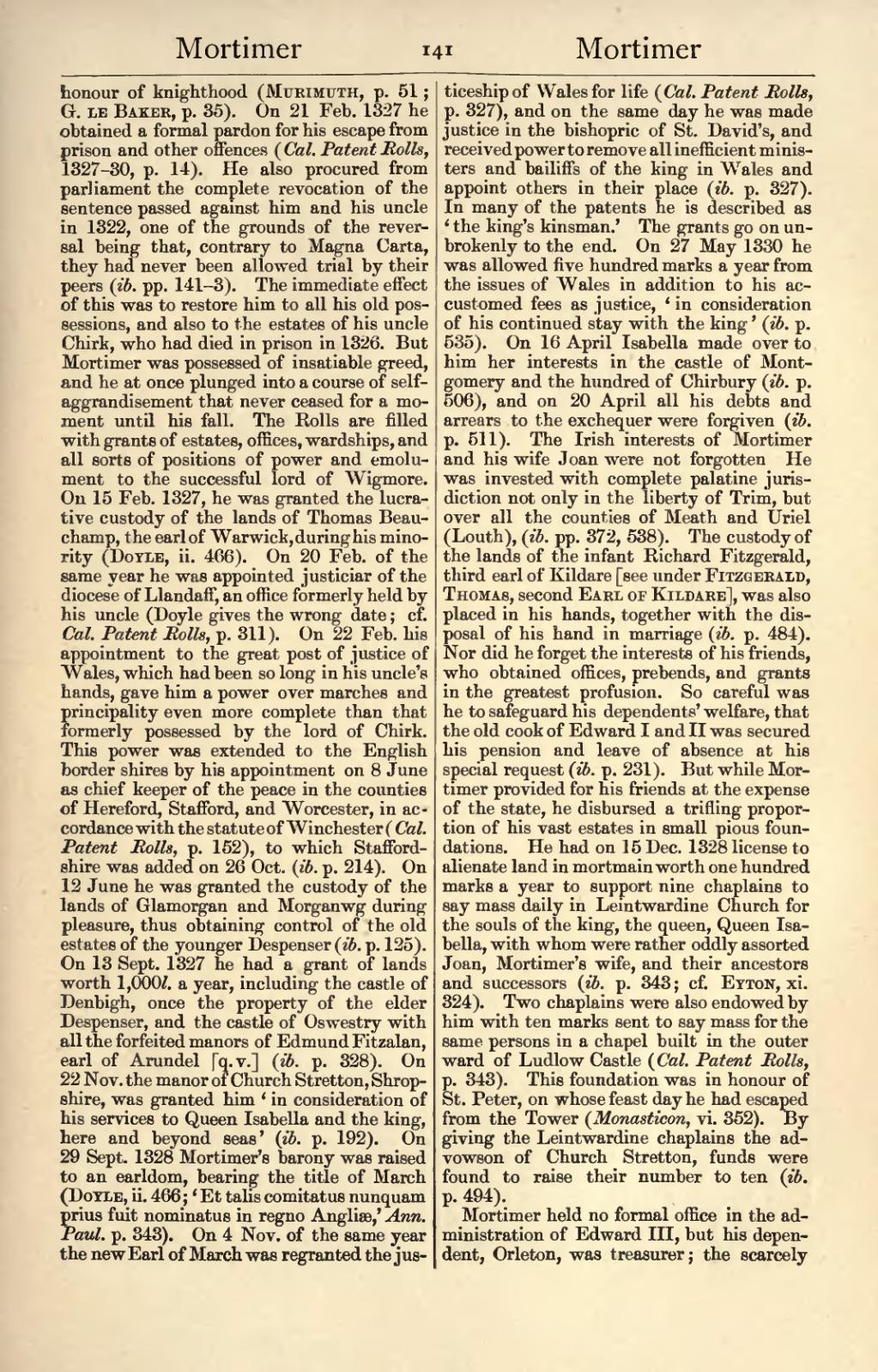honour of knighthood (Murimuth, p. 51 ; G. le Baker, p. 35). On 21 Feb. 1327 he obtained a formal pardon for his escape from prison and other offences (Cal. Patent Rolls, 1327-30, p. 14). He also procured from parliament the complete revocation of the sentence passed against him and his uncle in 1322, one of the grounds of the reversal being that, contrary to Magna Carta, they had never been allowed trial by their peers (ib. pp. 141-3). The immediate effect of this was to restore him to all his old possessions, and also to the estates of his uncle Chirk, who had died in prison in 1326. But Mortimer was possessed of insatiable greed, and he at once plunged into a course of self-aggrandisement that never ceased for a moment until his fall. The Rolls are filled with grants of estates, offices, wardships, and all sorts of positions of power and emolument to the successful lord of Wigmore. On 15 Feb. 1327, he was granted the lucrative custody of the lands of Thomas Beauchamp, the earl of Warwick, during his minority (Doyle, ii. 466). On 20 Feb. of the same year he was appointed justiciar of the diocese of Llandaff, an office formerly held by his uncle (Doyle gives the wrong date ; cf. Cal. Patent Rolls, p. 311). On 22 Feb. his appointment to the great post of justice of Wales, which had been so long in his uncle's hands, gave him a power over marches and principality even more complete than that formerly possessed by the lord of Chirk. This power was extended to the English border shires by his appointment on 8 June as chief keeper of the peace in the counties of Hereford, Stafford, and Worcester, in accordance with the statute of Winchester (Cal. Patent Rolls, p. 152), to which Staffordshire was added on 26 Oct. (ib. p. 214). On 12 June he was granted the custody of the lands of Glamorgan and Morganwg during pleasure, thus obtaining control of the old estates of the younger Despenser (ib. p. 125). On 13 Sept. 1327 he had a grant of lands worth 1,000l. a year, including the castle of Denbigh, once the property of the elder Despenser, and the castle of Oswestry with all the forfeited manors of Edmund Fitzalan, earl of Arundel [q.v.] (ib. p. 328). On 22 Nov. the manor of Church Stretton, Shropshire, was granted him ' in consideration of his services to Queen Isabella and the king, here and beyond seas' (ib. p. 192). On 29 Sept. 1328 Mortimer's barony was raised to an earldom, bearing the title of March (Doyle, ii. 466 ; ' Et talis comitatus nunquam prius fuit nominatus in regno Angliæ,' Ann. Paul. p. 343). On 4 Nov. of the same year the new Earl of March was regranted the justiceship of Wales for life (Cal. Patent Rolls, p. 327), and on the same day he was made justice in the bishopric of St. David's, and received power to remove all inefficient ministers and bailiffs of the king in Wales and appoint others in their place (ib. p. 327). In many of the patents he is described as 'the king's kinsman.' The grants go on unbrokenly to the end. On 27 May 1330 he was allowed five hundred marks a year from the issues of Wales in addition to his accustomed fees as justice, 'in consideration of his continued stay with the king' (ib. p. 535). On 16 April Isabella made over to him her interests in the castle of Montgomery and the hundred of Chirbury (ib. p. 506), and on 20 April all his debts and arrears to the exchequer were forgiven (ib. p. 511). The Irish interests of Mortimer and his wife Joan were not forgotten He was invested with complete palatine jurisdiction not only in the liberty of Trim, but over all the counties of Meath and Uriel (Louth), (ib. pp. 372, 538). The custody of the lands of the infant Richard Fitzgerald, third earl of Kildare [see under Fitzgerald, Thomas, second Earl of Kildare], was also placed in his hands, together with the disposal of his hand in marriage (ib. p. 484). Nor did he forget the interests of his friends, who obtained offices, prebends, and grants in the greatest profusion. So careful was he to safeguard his dependents' welfare, that the old cook of Edward I and II was secured his pension and leave of absence at his special request (ib. p. 231). But while Mortimer provided for his friends at the expense of the state, he disbursed a trifling proportion of his vast estates in small pious foundations. He had on 15 Dec. 1328 license to alienate land in mortmain worth one hundred marks a year to support nine chaplains to say mass daily in Lemtwardine Church for the souls of the king, the queen, Queen Isabella, with whom were rather oddly assorted Joan, Mortimer's wife, and their ancestors and successors (ib. p. 343 ; cf. Eyton, xi. 324). Two chaplains were also endowed by him with ten marks sent to say mass for the same persons in a chapel built in the outer ward of Ludlow Castle (Cal. Patent Rolls, p. 343). This foundation was in honour of St. Peter, on whose feast day he had escaped from the Tower (Monasticon, vi. 352). By giving the Leintwardine chaplains the advowson of Church Stretton, funds were found to raise their number to ten (ib. p. 494).
Mortimer held no formal office in the administration of Edward III, but his dependent, Orleton, was treasurer ; the scarcely
